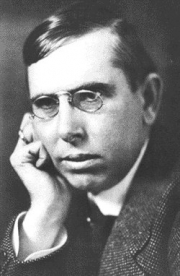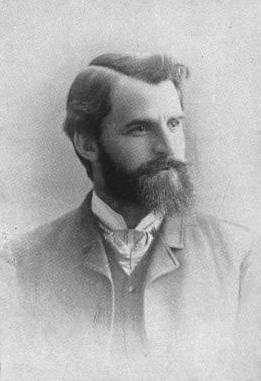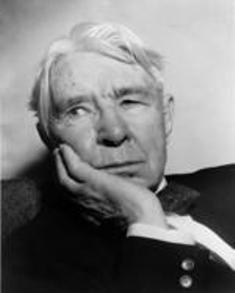
James W. Loewen
Born: 1942 in Decatur, Il
Died: August 19, 2021 in Washington D.C. Pen Name: None Connection to Illinois: Loewen grew up in Decatur and graduated from MacArthur High School in 1960. Biography: Loewen was an acclaimed historian and best-selling author whose mission was to overturn myths and misinformation that too often passed for U.S. history. A highly sought-after speaker and author, he engaged audiences with intelligence and humor, honing in on a range of topics encompassing U.S. history, multicultural education, civil rights, race relations, voting rights, law and social science. Loewen was the bestselling author of Lies My Teacher Told Me and Lies Across America. He was a regular contributor to the History Channel's History Magazine and was a professor emeritus of sociology at the University of Vermont. He lived in Washington, D.C.
Awards:
Twitter: https://twitter.com/JamesWLoewen
Website: https://justice.tougaloo.edu/
Website: http://hnn.us/blog/author/11
Selected Titles
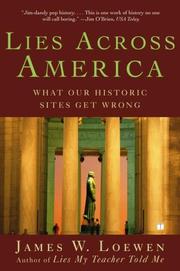 |
Lies across America : ISBN: 074329629X OCLC: 44683607 Simon & Schuster, New York : 2000. "Offers startling revelations about sites we think we know; Valley, Forge, Abraham Lincoln's log cabin, the Intrepid. It also tells of new sites, events, and individuals that should be commemorated on the landscape but are't; a tombstone with a story to tell in Mississippi, a spy in the confederate White House, the unforeseen fallout from the first nuclear missile test, the reverse underground railway, a modern "sundown" town (blacks can work there, j but they'd better leave before the sun sets). It asks why, across our landscape, Indians are consistently "savage", tribal names are wrong and derogatory, whites "discover" everything, and the term "massacre" is a one-way street; why war museums have selective memories, guides at FDR's family mansion in Hyde park are "specifically forbidden" to talk about Roosevelt's mistresses, and James Buchanan's house denies that he was gay. It muses about the Civil War mare in Kentucky who got an extra body part, the Polynesian King made to look like a Roman emperor on monuments in Hawaii, and the statue of a conquistador in New Mexico who lost his foot." |
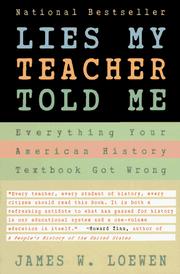 |
Lies my teacher told me : ISBN: 0684818868 OCLC: 173685165 Simon & Schuster, New York : 2007. Criticizes the way history is presented in current textbooks, and suggests a fresh and more accurate approach to teaching American history. |
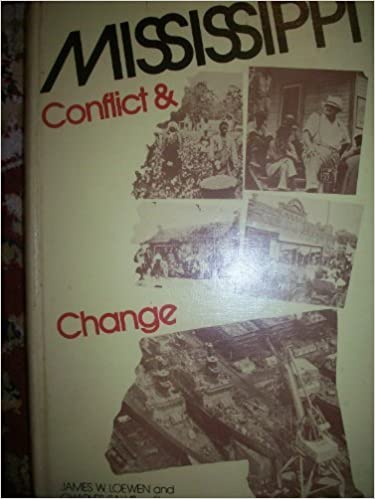 |
Mississippi, conflict & change ISBN: 0394710088 OCLC: 7339164 Pantheon Books, New York : ©1980. |
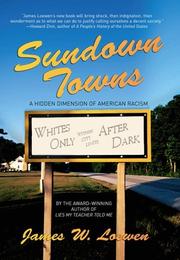 |
Sundown towns : ISBN: 156584887X OCLC: 58789453 New Press : New York : 2005. Loewen (emeritus, sociology, U. of Vermont) exposes the history and persistence of "sundown towns," so-named for the signs often found at their corporate limits warning African Americans and other minorities not to be found in the town after dusk. He historically situates the rise of the sundown town movement in the years following the Civil War; describes the mechanisms of violence, threats, law, and policy that were used to force minorities out of Northern and Western towns into the big cities; and charts the continued existence of such communities. In considering the sociology of sundown towns he investigates the causes that underlie the existence of sundown towns and discusses why the phenomena has remained largely hidden. The social costs of sundown towns on whites, blacks, and the social system are then detailed and recommendations for fixing this blight on the body politic are proffered. Includes information on Anna, (Illinois), anti Semitism, Appalachian region, Appleton (Wisconsin), Arkansas, Asian Americans, Atlanta (Georgia), Berwyn (Illinois), Beverly Hills (California), black Americans, Boley (Oklahoma), Brown v. Board of Education, George W. Bush, Buchanan v. Warley, Cairo (Illinois), California, Chicago (Illinois), Chinese Americans, Cicero (Illinois), Corbin (Kentucky), Cullman (Alabama), Darien (Connecticut), Dearborn (Michigan), Democratic Party, Detroit (Michigan), Du Quoin (Illinois), economic factors, Edina (Minnesota), educational aspects, Effingham (Illinois), employment, Florida, Fond du Lac (Wisconsin), Forsyth County (Georgia), Fourteenth Amendment to the Constitution, Gainesville (Florida), Glendale (California), Granite City (Illinois), Great Migration, Great Retreat, Greenwich (Connecticut), Grosse Pointe (Michigan), Harrison (Arkansas), Highland Park (Texas), Idaho, Illinois, immigration, Indiana, Jews, Jonesboro (Illinois), Kenilworth (Illinois), Ku Klux Klan, legal aspects, Long Island (New York), Los Angeles (California), lynchings, Martinsville (Indiana), Medford (Oregon), Mississippi, Missouri, Native Americans, New York, Norman (Oklahoma), Oak Park (Illinois), Ohio, Ocoee (Florida), Orlando (Florida), Owosso (Michigan), Pana (Illinois), Pierce City (Missouri), Pinckneyville (Illinois), political factors, racial stereotypes, real estate aspects, Republican Party, Rosewood (Florida), segregation, Sheridan (Arkansas), signs in sundown towns, social class factors, Jones v. Mayer, Milliken v. Bradley, Plessy v. Ferguson, Shelley v. Kraemer, Valparaiso (Indiana), voting rights, Warren (Michigan), Washington, D.C., West Frankfort (Illinois), white Americans, Wisconsin, Wyandotte (Michigan), Zeigler (Illinois), etc. |
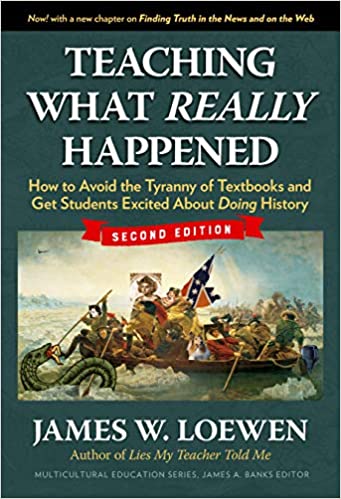 |
Teaching what really happened : ISBN: 9780807777312 OCLC: 1048660047 James Loewen has revised Teaching What Really Happened, the bestselling, go-to resource for social studies and history teachers wishing to break away from standard textbook retellings of the past. In addition to updating the scholarship and anecdotes throughout, the second edition features a timely new chapter entitled "Truth" that addresses how traditional and social media can distort current events and the historical record. Helping students understand what really happened in the past will empower them to use history as a tool to argue for better policies in the present. Our society needs engaged citizens now more than ever, and this book offers teachers concrete ideas for getting students excited about history while also teaching them to read critically. It will specifically help teachers and students tackle important content areas, including Eurocentrism, the American Indian experience, and slavery. Book Features: An up-to-date assessment of the potential and pitfalls of U.S. and world history education. Information to help teachers expect, and get, good performance from students of all racial, ethnic, and socioeconomic backgrounds. Strategies for incorporating project-oriented self-learning, having students conduct online historical research, and teaching historiography. Ideas from teachers across the country who are empowering students by teaching what really happened. Specific chapters dedicated to five content topics usually taught poorly in today’s schools. |


